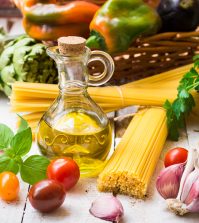- Make It Yourself Lavender Heart-Shaped Bath Bombs!
- 20 Things You Never Knew About “Down There”
- 12 Best Foods For Those Suffering From Arthritis Pain
- 12 Personal Hygiene Mistakes Almost Everyone Makes (Mom Never Told You About #4!)
- 15 Medicinal Plants And Herbs From The Cherokee People
- 12 Mind-Blowing Benefits Of Drinking Coconut Water During Pregnancy
- 12 Outstanding Winter Foods That Won’t Fatten You Up Like A Christmas Turkey
25 of the Top Foods to Control Diabetes (You Won’t Even Believe #19!)

Photo credit: bigstock.com
11. Flax Seeds
We already talked about the health benefits of seeds, but flax seeds deserve a special mention. These shiny, brown, very thin seeds are rich in fiber, full of healthy fats and omega-3s, and are a great source of magnesium. Flax seeds need to be ground up to release their active compounds. They can also go rancid fairly quickly, so buy the whole seeds in bulk. Store them in an airtight container in the freezer, then grind as needed. Try adding two or three teaspoons each day to your yogurt, cereal, meatloaf, or bread.
12. Oatmeal
There is nothing like a big warm bowl of oatmeal to start the day off right. Oats are full of that healthy fiber you want to eat more of because it slows the absorption of glucose. It also has high levels of important antioxidants, which can stabilize blood sugar levels.
13. Eggs
Who doesn’t love eggs for breakfast?! This is a terrific source of inexpensive protein that can’t be beat. In fact, eggs are such a great source of protein that nutritionists use eggs to rank all other types of protein! Contrary to popular belief, eggs will not raise your cholesterol levels, and they keep you feeling full for hours. You can also hard boil eggs for a quick snack, or to slice in your lunchtime salad.
14. Red Foods
Foods that are rich in quercetin are generally red in color. One study out of Finland found that men who consumed a large amount of food containing quercetin had a 20 percent lower death rate related to diabetes or heart problems. Great sources of quercetin are red grapes, tomatoes, red onions, and all types of red berries, such as strawberries.
15. Carrots
Did you hear that carrots spike blood sugar levels? This statement isn’t entirely true. Although carrots do contain a type of sugar that is absorbed into the blood quickly, they actually contain very little sugar. This is good news if you have been avoiding carrots because of this information. Carrots are high in beta-carotene, which is linked to both a lower risk of diabetes as well as better control of your blood sugar levels. If you don’t care for them raw, try roasting them or steaming them. You can also boil them and mash them like potatoes for a change of pace.
Continue to Page 4
































